The Americans had their eyes glued to the television. That night, March 8th,1971, Joe Frazier and Muhammad Ali were fighting each other at Madison Square Garden, a traditional indoor arena in New York, the first of their legendary fights of the century.
They fought through fifteen dramatic rounds.
Frazier was the world heavyweight champion. His challenger, undefeated, had had the highest belt in his category stripped from him for refusing to fight in the Vietnam War.
Most of the white fans craved for the defeat of the man who “flew like a butterfly and stung like a bee”, as described by himself. Ali was the great symbol of the resistance against racial supremacy in a nation still marked by segregation; a star of civil disobedience against the anti-Communist hawks who ruled the White House.
Reproduction/The Sparrow Project
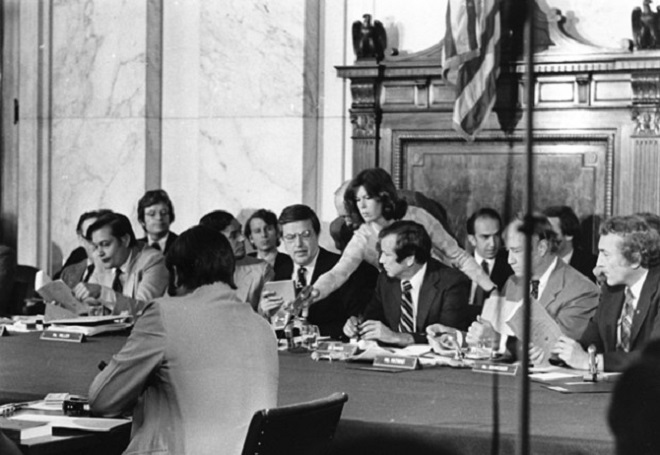
The Church Comitee, in the US Senate, denounced illegal CIA and FBI practices
During the 11th round, the black idol of the conservative middle class knocked down Ali with a left hook. Ali fell on his back. Recovered. Rose stunned. Slowly, he dragged himself to finish the fight, which ended with his defeat by points.
Less than 200 kilometers away in Media, Pennsylvania, a group of eight young people prepared for a spectacular action. They were a part of a small organization called Citizens' Commission to Investigate the FBI.
Their leader was William Cooper Davidon, a physics and mathematics university who, on the same date, turned 44 years old. He would enter history, soon we shall see, as an Edward Snowden or a Julian Assange of the analog era.
They were ready, after months of preparation, to invade the city’s FBI office, where they imagined they would find compromising documents on police activities during that troubled period in U.S. history.
The papers they found were parte of a little treasure: the secrets of the Counter Intelligence Program (COINTELPRO), a clandestine plan of J. Edgar Hoover to face the Communists and other insurgent groups.
COINTELPRO: “Expose, infiltrate, manipulate.” 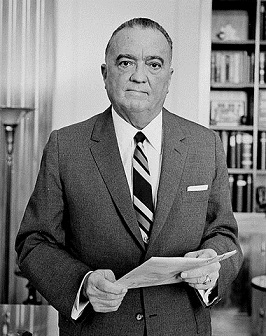
Conceived in 1956 at the peak of the Cold War, the COINTELPRO would be officially interrupted in 1971, soon after the findings of Davidon and his companions began to circulate in the press.
One of the documents, signed by Hoover himself, on August 25th, 1967, determined the goals of the program’s new phase: “to expose, infiltrate, disrupt, manipulate, discredit, neutralize and, if necessary, eliminate black nationalist hate-based organizations and groups, their leaderships, spokesmen, members, and supporters.”
It was an internal war declaration that didn’t have any consent from the parliament or government recognition.
The “vale-tudo” included fabricating evidence, forging crimes, provoking internal conflicts, destroying material resources, media war, control of the legal system and cold-blooded murders.
Although publicly suspended, the program would still be secretly conducted until 1975, when investigations opened by the Senate forced the CIA and the FBI to reorganize their operating manual.
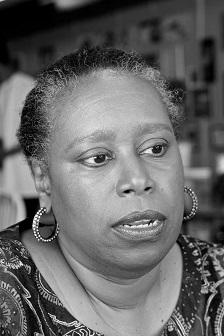 The chief inquirer, Frank Church, a Democrat senator from Idaho whose surname baptized the commission in charge, was clear and concise in his conclusions: “these are illegal and anti-American activities.”
The chief inquirer, Frank Church, a Democrat senator from Idaho whose surname baptized the commission in charge, was clear and concise in his conclusions: “these are illegal and anti-American activities.”
This is also the opinion of Cynthia McKinney, 61, a former federal representative for Georgia. A Democrat like Church, she devoted much of her academic and parliamentary life to study the subject.
“There were no limits to state action regarding the combat against rebel organizations,” she says. “The main targets were clearly the minority groups such as blacks, Native Americans and Latinos.”
In her youth, she was sympathetic to the Black Panthers. But Cynthia never considered herself as an “active revolutionary”, although she has actively participated in researching and reporting the repressive apparatus that let hundreds of activists to prison and dozens to death.
“The country's elites panicked with the black uprisings and the movement against the Vietnam War,” she analyzes. “The white supremacy system and the corporations' ruling could not coexist with a situation that seemed to jeopardize their hegemony.”
The former representative emphasizes that the reaction was not restricted to repressive action.

NULL
NULL
“The strategy was supported by a collusion between police devices and the media, which still exist” she says. “The COINTELPRO documents show that a third of its budget was dedicated to bribe journalists and vehicles that participated in the demonization of the insurgents”.
Her assessment is supported by writer Sara Flounders, currently the main leader of the International Action Center, an organization founded by former Attorney General of the Republic, Ramsey Clark, to oppose wars promoted by the United States and the persecution of minorities inside the country.
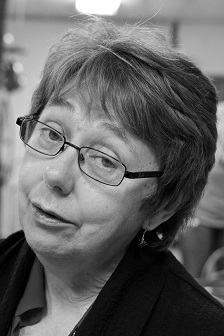 “The FBI’s intervention overstepped repressive measures, conditioned the communication industry's behavior and contaminated the legal system,” she says. “The trials of most political prisoners were farces, with fabricated evidence, witnesses under pressure and illegal decisions.”
“The FBI’s intervention overstepped repressive measures, conditioned the communication industry's behavior and contaminated the legal system,” she says. “The trials of most political prisoners were farces, with fabricated evidence, witnesses under pressure and illegal decisions.”
Church Commission
The acknowledgment of these facts is in the Church Commission's, completed in 1976. Contrary to what occurred in other countries, however, the findings of the illegalities committed by the state were not accompanied by an amnesty policy or a reparation of the brutalities.
One of the few exceptions was the case of Dhoruba Bin Wahad, 70, born Richard Earl Moore.
One of the Black Panther leaders in the Bronx, New York, Wahad lived in clandestinity. Founder of the armed branch of the organization, he was captured by the police while leading the invasion of a local club dominated by drug dealers.
“Drugs were encouraged in black communities, particularly heroin, as a part of the CIA’s and FBI’s strategy,” he records. “Drug dealing helped finance illegal intelligence activities abroad and was a destabilizing element of the anti-racist fight”.
The John Kerry Committee, in 1986, headed by the current Secretary of State, then a Massachusetts senator, effectively proved that public resources were offered to dealers who were willing to collaborate with the enemies of the Sandinista revolution in Nicaragua during the 80’s. Despite strong cover up indications, there is no official recognition of the alleged facilities drug trade within the United States had.
The Black Panthers, however, were convinced that the future of their party was conditioned to cleaning the neighborhoods in which they operated from drug dealing.
Arrested on September 1971, in one of the confrontations with organized crime, Wahad was the big fish that the police hoped to present as being responsible for a widely reported shooting.
Youtube
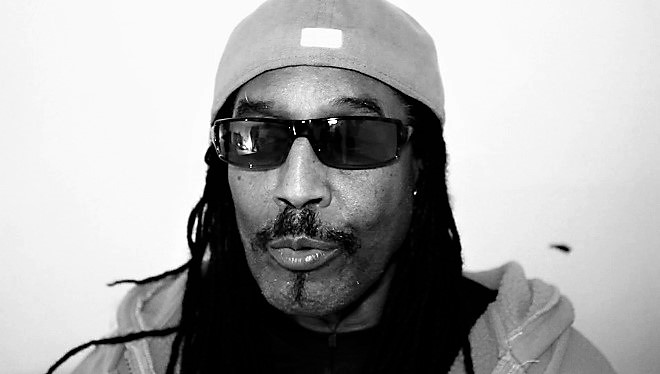
Police captures Dhoruba Bin Wahad when he led an invasion on a local club controle by drug dealers
On May 19th, two police officers had been shot down with a machine gun in front of Frank Smithwick Hogan’s house, who was New York's Attorney General and one of the exponents in the campaign against the rebel organizations.
Wahad was sentenced to life imprisonment, with right to parole, a sentence based on witnesses who reported seeing or knowing of his alleged participation in the crime.
Revision
After four years in jail, he heard about the information brought to the public by the Church Commission and his lawyers filed a lawsuit to gain access to those documents.
During the next fifteen years, the FBI released more than 300,000 pages with various information. Trying to sink the defense in a sea of paper, its agents eventually gave them transcripts of the witnesses’ reports against, in which was clear that they had changed their version due to police pressure.
On March 15th, 1990, Judge Peter J. McQuillan from the Supreme Court of New York, annulled the previous judgment on the fact that the prosecution had concealed evidence that could exonerate the defendant.
Video shows how the US government viewed the Black Panthers group
The same court also denied the request for a new trial, determining that the federal government should pay a compensation of US$400,000 to Wahad. This decision, made in 1995, was followed by another one, five years later, forcing the city of New York to pay another US$490,000 due to moral and material damages.
Soon after that, the state parliament repealed the law that allowed a revision of final judgments in case of testimonial evidence omission.
“We used to live and continue to live in a police state,” says Wahad. “Democratic freedoms are only guaranteed to those who do not threaten the system. Otherwise, as happened to the 60's and 70's movements, the answer will always be an extermination policy.”
Português: Programa secreto do FBI coordenou repressão política nos Estados Unidos
Español: Programa secreto del FBI coordinó represión política en los EE.UU.
Read more articles of the USA Political Prisioners Series:
Former prisoners organize solidarity towards current political detainees
'I am a revolutionary and an optimistic', says former Black Panther
You may also like the 1st stallment of the series:
United States hide information about its political prisoners
A man who no longer wanted masters
The Black Panthers were the 60’s vanguard
A list of 54 political prisoners in the United States





















































